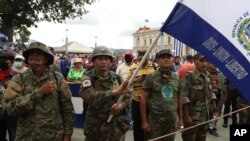On the day that Central America celebrated its Independence, on Thursday, the president of El Salvador, Nayib Bukele, announced on national television that he will seek presidential re-election in 2024, after the Constitutional Chamber reinterpreted the Constitution of the Central American country, opening the way for immediate reelection.
The almost two-hour speech included some remarks to the international community that in recent months has criticized the extensions to an exceptional regime that has already left at least 52,000 people detained and 73 dead in the custody of the Salvadoran State.
“I announce to the Salvadoran people that I have decided to run as a candidate for the presidency of the Republic (…) more than one developed country will not agree, but it is not they who will decide but the Salvadoran people,” said the president in the middle of an ovation of officials of the three State organs.
If the diplomacy of a country opposes “it would be a hypocritical protest”, added the president, because “all of them have the re-election”.
According to Bukele, El Salvador is now experiencing a “true independence”, because in his government it was decided not to “obey international dictates” and that path “for the first time in history, is the correct one”.
El Salvador’s Constitution prohibits running as a presidential candidate in two consecutive elections. However, the magistrates elected in May 2021 by Bukele’s allies in Congress established that the decision for a president to continue in power rests with the voters.
“Competing again for the presidency does not de facto imply that he will be elected,” states the sentence of September 4 of last year.
Contrary to Salvadoran Vice President Félix Ullóa, Bukele had kept quiet about the possibility of his re-election. On the other hand, Ullóa said publicly two months ago that the rulings of the Chamber are mandatory, referring to the possible re-election of the president.
After thirty years in which the Alianza Republicana Nacionalista (ARENA) and the left-wing formula of the Farabundo Martí National Liberation Front (FMLN) governed, Bukele, 41, won the presidency of El Salvador in 2019.
Despite the hundreds of complaints about arbitrary arrests during the emergency regime or the legalization of bitcoin as a second currency, the political wear and tear does not seem to reach the president, who enjoys high popularity according to some opinion polls.
The first reactions
Few words were used by the director of the Americas Division of Human Rights WatchJosé Miguel Vivanco, regarding the announcement of the possible re-election of Bukele in El Salvador:
“Absolutely predictable. That was always the original plan. Today a new Chavez arises”, he expressed on his Twitter account.
Some Salvadoran lawyers such as Humberto Sáenz and José Marinero expressed their disagreement. “Re-election is prohibited six times,” Sáenz said on his Twitter account. While Marinero pointed to El Salvador as a country without checks and balances in power.
While the president of Congress, Ernesto Castro, described Nayib Bukele’s announcement as a “great moment” that will allow “the transformation of the country.”
The announcement occurred hours after El Salvador divided into two marches for September 15: one showed the parade of firefighters, police officers and members of the Armed Forces who took center stage in the civic parade.
The other was a peaceful protest in which civil society organizations and civilians participated to demand that the Salvadoran government respect constitutional rights.
Connect with the Voice of America! Subscribe to our channel Youtube and turn on notifications, or follow us on social media: Facebook, Twitter and Instagram.




![[Img #74664]](https://thelatestnews.world/wp-content/uploads/2024/12/James-Watson-The-controversial-genius-behind-the-double-helix-150x150.jpg)










Add Comment